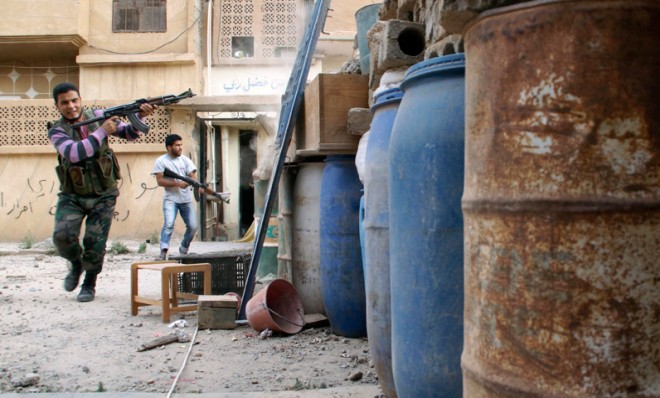Will arming rebels turn the tide of Syria's war?
The U.S. wades deeper into the conflict after concluding the Assad regime has crossed a red line by using chemical weapons


A free daily email with the biggest news stories of the day – and the best features from TheWeek.com
You are now subscribed
Your newsletter sign-up was successful
President Obama has authorized the delivery of weapons to Syrian rebels after the U.S. concluded that government forces had indeed used illegal chemical weapons, which Obama had described as a "red line."
The rebels have faced a run of stinging setbacks recently. First, they lost the strategically important city of Qusayr on the Lebanese border, after thousands of Hezbollah militants from Lebanon poured in to assist Syrian President Bashar al-Assad's forces. Now, the Syrian military is launching an offensive against another rebel stronghold, Aleppo.
Will U.S. weapons help the rebels turn the tide?
The Week
Escape your echo chamber. Get the facts behind the news, plus analysis from multiple perspectives.

Sign up for The Week's Free Newsletters
From our morning news briefing to a weekly Good News Newsletter, get the best of The Week delivered directly to your inbox.
From our morning news briefing to a weekly Good News Newsletter, get the best of The Week delivered directly to your inbox.
Many experts say the aid could have helped the rebels win earlier, but now it's too little, too late. Con Coughlin at Britain's Telegraph says Obama could have propelled pro-democracy demonstrators to victory if he had backed them fully when their uprising began more than two years ago. Now, though, al Qaeda fighters have hijacked the rebel cause, he says, and 93,000 people have died in a fight that true supporters of democracy can no longer win.
Rather than seeing the explosion of political dissent in Syria as a golden opportunity to rid the world of a ruthless and brutal dictatorship that has been actively hostile to American interests in the region for more than four decades, Mr. Obama was seized by a fit of inaction. According to his reasoning, supporting the rebels might draw the U.S. into another costly war which would outweigh the benefit of removing the Assad gang.As a consequence, the Obama administration was reduced to the status of impotent observers as the Syrian conflict went into a downward spiral, with al Qaeda fanatics seizing control of the moderate, pro-Western movement and the Iranians and Russians openly supplying arms and expertise to President Bashar al-Assad to aid his attempt to remain in power. [Telegraph]
At the very least, though, it will be a lot harder for Assad to finish off the rebels now that the U.S. is stepping up military aid. David Butter of Chatham House, an international affairs think tank, tells ITV that Obama appears to be responding to Assad's victory in Qusayr, in a bid to prevent the regime from crushing its opponents with help from Iran and Hezbollah. The U.S., Butter says, "probably judges that the rebels need critical support to prevent regime breakthroughs in Deraa (south) and Aleppo (north)."
But for that to happen, the rebels will need the U.S. weapons fast. "I think the rebels are in trouble," Jeffrey White of the Washington Institute for Near East Policy tells The New York Times. "Speed is of the essence. The regime's momentum needs to be brought to a halt."
Some analysts think that dragging out the war might be what the Obama administration is aiming to accomplish. Daniel W. Drezner at Foreign Policy suggests that arming the rebels is just an extension of the same "unspoken, brutally realpolitik policy towards Syria that's been going on for the past two years." Drezner says the U.S. wants to force Iran, Hezbollah, and Assad into "doubling down and committing more resources" to this war; that requires doing just enough to make sure "rebels are holding their own or winning."
A free daily email with the biggest news stories of the day – and the best features from TheWeek.com
This is simply the United States engaging in its own form of asymmetric warfare. For the low, low price of aiding and arming the rebels, the U.S. preoccupies all of its adversaries in the Middle East.The moment that U.S. armed forces would be required to sustain the balance, the costs of this policy go up dramatically, far outweighing the benefits. So I suspect the Obama administration will continue to pursue all measures short of committing U.S. forces in any way in order to sustain the rebels. [Foreign Policy]
So how far will Obama go? The Obama administration is balking at sending anti-aircraft weapons, over concerns that al Qaeda-linked rebel factions might get their hands on them and use them to take down an airliner. But Obama has reportedly approved sending anti-tank weapons, and diplomats say the U.S. is even considering imposing a no-fly zone along the Jordanian border.
Harold Maass is a contributing editor at The Week. He has been writing for The Week since the 2001 debut of the U.S. print edition and served as editor of TheWeek.com when it launched in 2008. Harold started his career as a newspaper reporter in South Florida and Haiti. He has previously worked for a variety of news outlets, including The Miami Herald, ABC News and Fox News, and for several years wrote a daily roundup of financial news for The Week and Yahoo Finance.
